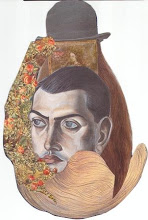
I thought I’d be able to remember, with slightly
better clarity, the shelf I pulled this CD from the first time I got it
from the Anderson Library. Granted, it’s not a memory I’ve called on before so
the fact that it has decayed and flaked away is not a shock. I’m just
disappointed. I thought it would be there. After all, I clearly remember
listening to it that first time, sitting on my bed with a book of photographs
of Antarctica. I don’t remember the name of the book either, and that irks me a
tiny bit as well. But the sophisticated and ruminative melodies, the spare and
emotionally charged play of Heifetz and Emmanuel Bay, of Heifetz, Rubenstein
and Piatigorski. It was all so strange, the melodies so brooding yet delicate,
the structures counter intuitive and modern yet sympathetic and seemingly
ancient.
I know, based on simple
chronology, what the Library would have looked like at that time. It has
undergone considerable renovation and redesign since then. The audio/visual
section had a separate room on the ground floor back then, whereas now it’s all
one unbroken space with the periodicals, computers, and main library book stacks. Yet in my
mind I can only recall finding that disc among the shelves as they are now, as
they have been for ten years, the incident in question being more
like fifteen years past. I was sixteen and spent much of my time wandering the Library the
way some try out their driver’s license. Exploring a sense of freedom, testing
the boundaries of comprehension and reflex. I tended toward classical music and
foreign film. I wanted to become quietly pretentious as soon as possible.
Vol. 44 of RCA’s Heifetz collection, released in
1994 and featuring recordings from the 1940's and 50's of solo, duet and trio pieces by Debussy, Ravel,
Martinu and Respighi. Its sepia tone packaging and digital audio transfer from
magnetic tape, only having reduced the inherent pop and hiss of that medium to
a certain degree. Thus maintaining an authenticity of texture that can feel
like time travel. Because we always assume, if we were to go backwards in time the past would be somehow more real, more textured and resonant. And that’s what
these recordings deliver. That album came to define a sense of the otherworldly, the dream space and the proto-real, something more basic and honest than
mundane existence.
I just can't believe that I don't recall finding it.
That I couldn't tell you what else happened that evening. The whole thing is
blank until I turned on the music and opened that book of oversized photographs
of icebergs and Macmurdo Station. Then it's all pristine as daylight. I never
forget so rich a trance as I entered listening to those Heifetz pieces, but normally it
carries with it the debris of the preceding hours. I can normally count on that
much. For some reason though this was too surprising, too unprecedented and
complete a discovery and left not a wake in which other memories could drag
behind but instead a crater into which would arrive whatever came next and outside which the past was blown clear.

No comments:
Post a Comment